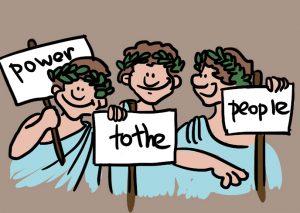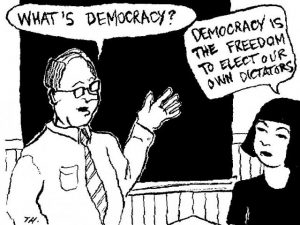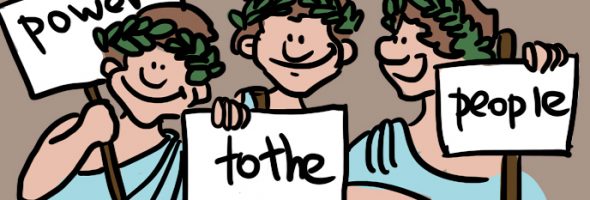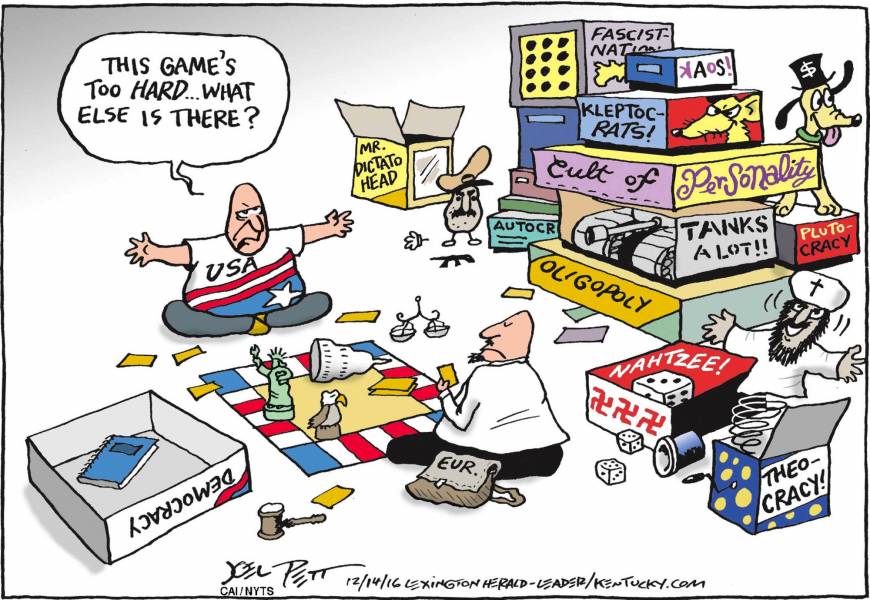The following is a chapter from Money, Sex, Power & Faith.
Order your copy in paperback or for Kindle!
 “We are usually told that democracy originated in ancient Athens— like science, or philosophy, it was a Greek invention. It’s never entirely clear what this is supposed to mean. Are we supposed to believe that before the Athenians, it never really occurred to anyone, anywhere, to gather all the members of their community in order to make joint decisions in a way that gave everyone equal say?”
“We are usually told that democracy originated in ancient Athens— like science, or philosophy, it was a Greek invention. It’s never entirely clear what this is supposed to mean. Are we supposed to believe that before the Athenians, it never really occurred to anyone, anywhere, to gather all the members of their community in order to make joint decisions in a way that gave everyone equal say?”
– David Graeber, Fragments of an Anarchist Anthropology
After the exhausting experience of declaring their independence, American leadership postponed the ratification of an operating procedure. The Articles of Confederation, which provided governmental guidelines, was deliberated upon for five years before being put into effect in 1781. They were ultimately deemed ineffective in organizing the economy due to the absence of a strong central government, each of the states wanting its own independence and sovereignty.
George Washington criticized the weak government that the Articles of Confederation offered, having watched his soldiers go hungry and without supplies due to its inefficiency. In addition, as a businessman and landowner, without a central government to organize the digging of canals and waterways he needed for trade routes, he was supportive of the move toward a rewrite. During the summer of 1787, Washington, Madison, and fifty-five other state delegates met initially to draft some amendments to the Articles of Confederation, but ended up scrapping the whole thing and coming up with the Constitution instead.
However not everyone wanted a big federal government. As one critic wrote in the Boston Gazette on November 26, 1787, “I had rather be a free citizen of the small republic of Massachusetts, than an oppressed subject of the great American empire.” Another critic, posting in the Philadelphia Independent Gazetteer on January 16, 1788, found it “astonishing that so flimsy and deceptive a doctrine should make converts among the enlightened freemen of America, who have so long enjoyed the blessings of liberty.”
The Articles of Confederation had limited a strong central government in order to more greatly empower the states to govern themselves, however, the Constitution left out descriptions of the individual states as “sovereign” and “independent” as the Articles had. Instead, the federal government became the law of the land to which all states would be subservient, even the former critics. As much as the majority feared the overwhelming rule of a federal government, those creating the federal government feared the overwhelming rule of the majority.
 Although Adam Smith’s ideas were embraced as a great theory, and though the American Founding Fathers desired to empower the individual citizens of the new country to rise up in their virtues of industry and ambition, they were a little wary of giving the common man too much power. In discussing the development of a democracy for the Federalist Papers, James Madison wrote that democracies “have ever been spectacles of turbulence and contention; have ever been found incompatible with personal security or the rights of property; and have in general been as short in their lives as they have been violent in their deaths… A republic,” he declared, “by which I mean a government in which the scheme of representation takes place, opens a different prospect, and promises the cure for which we are seeking.”
Although Adam Smith’s ideas were embraced as a great theory, and though the American Founding Fathers desired to empower the individual citizens of the new country to rise up in their virtues of industry and ambition, they were a little wary of giving the common man too much power. In discussing the development of a democracy for the Federalist Papers, James Madison wrote that democracies “have ever been spectacles of turbulence and contention; have ever been found incompatible with personal security or the rights of property; and have in general been as short in their lives as they have been violent in their deaths… A republic,” he declared, “by which I mean a government in which the scheme of representation takes place, opens a different prospect, and promises the cure for which we are seeking.”
The general consensus at the time was that common folk wouldn’t have the time, education, or common sense to vote on every little thing, and the citizenry would best be served by a republic instead of an actual democracy. The glory years of Rome were organized by a republic, before it became an empire and fell, and England had faired pretty well as a republic during its short time without a monarch. Madison went on to describe the role of the republic as an entity to “refine and enlarge the public views by passing them through the medium of a chosen body of citizens whose wisdom may best discern the true interest of their country and whose patriotism and love of justice will be least likely to sacrifice it to temporary or partial considerations. Under such a regulation it may well happen that the public voice, pronounced by the representatives of the people, will be more consonant to the public good than if pronounced by the people themselves, convened for the same purpose.”
Besides, only the 6% of the population who were white, male property owners were eligible to vote in the first presidential election anyway.
“The picture of American society has,” wrote Alexis de Tocqueville in Democracy in America, “ if I may so speak, a surface covering of democracy, beneath which the old aristocratic colors sometimes peep out.”
Although America has since loudly and proudly declared itself to be a democracy for its citizens’ ability to vote on their representatives every 2 to 4 years, the word “democracy” is never mentioned in neither the Declaration of Independence or the United States Constitution.
“If we take the term in the strict sense,” reasons Rousseau in The Social Contract, “there never has been a real democracy, and there never will be. It is against the natural order for the many to govern and the few to be governed.”
The Constitution was drafted to reflect the principles of a republic and develop the three branches of government in seven articles, laying out the basics of the government, its exclusive right to coin money, and an openness to be amended as the country evolved.
These days, we upgrade apps on our smart-phones several times a month as the bugs are worked out of the programs and improvements come to light through ingenuity and greater understanding. Yet the technology we created as the foundation of our freedoms and the lives we create, the Constitution of the United States, although it was written so that it could be amended, has only been upgraded twenty-seven times in 227 years. It has hardly been considered for upgrade since the last one in 1992, when Congress finally thought it prudent to force themselves to always wait a year before giving themselves another raise They waited just over 202 years to ratify that one, as it was proposed along with the original Bill of Rights. The previous amendment was in 1967, when, after having eight presidents die in office, Congress finally decided to develop a protocol for being left without the leadership of the most powerful person in the world.
It’s not that Americans aren’t trying to amend the Constitution. Since its inception, there have been roughly 12,000 proposals for amendments, but now that civil rights seem to have been covered, and we’re finally prepared in case another president dies in office, we don’t seem that hard pressed to change much else. However, it is rather remarkable that the most powerful country in the world has the shortest Constitution in use.
Order your copy of Money, Sex, Power & Faith today!


